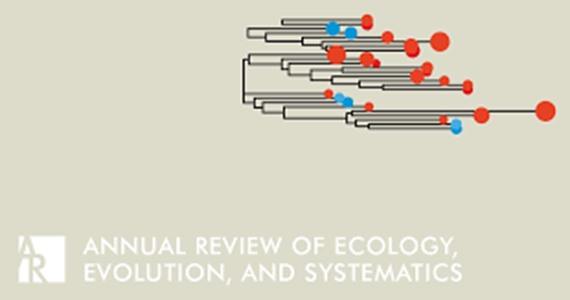鲸鱼如何潜水,盛宴和快速:鲸类动物进化中觅食的生态生理驱动因素和限制
IF 11.2
1区 生物学
Q1 ECOLOGY
Annual Review of Ecology, Evolution, and Systematics
Pub Date : 2023-08-29
DOI:10.1146/annurev-ecolsys-102220-025458
引用次数: 1
摘要
鲸鱼是研究生态学和进化问题的一个非凡群体,因为它们的极端体型和独特的觅食策略在动物中是无与伦比的。从陆地祖先开始,鲸鱼进化出了专门的海洋觅食机制,这是两种主要的鲸类动物的特征:齿鲸的回声定位和须鲸的大量过滤进食。在齿鲸中,特定血统的体型增加,潜水能力增强,回声定位使它们能够捕食地球上最丰富的猎物:深海鱼类和头足类动物。更大的体型增加,以及滤食和禁食能力,使大型须鲸能够长距离迁徙,并利用浮游猎物,如磷虾或鱼类,这些猎物非常丰富,但转瞬即逝。对于这两个种群来说,猎物的丰度和分布限制了它们的觅食表现,产生了不同的能量生态位,这些生态位塑造了它们向巨型动物的趋同进化。预计《生态、进化和分类学年度评论》第54卷的最终在线出版日期是2023年11月。修订后的估计数请参阅http://www.annualreviews.org/page/journal/pubdates。本文章由计算机程序翻译,如有差异,请以英文原文为准。
How Whales Dive, Feast, and Fast: The Ecophysiological Drivers and Limits of Foraging in the Evolution of Cetaceans
Whales are an extraordinary study group for questions about ecology and evolution because their combinations of extreme body sizes and unique foraging strategies are unparalleled among animals. From a terrestrial ancestry, whales evolved specialized oceanic foraging mechanisms that characterize the two main groups of living cetaceans: echolocation by toothed whales and bulk filter feeding by baleen whales. In toothed whales, lineage-specific increases in body size, enhanced diving capacity, and echolocation enable them to hunt the most abundant prey on the planet: deep-sea fish and cephalopods. Even greater body size increases, along with filter feeding and fasting capacity, permit large baleen whales to migrate long distances and exploit epipelagic patches of schooling prey, such as krill or fish, which are highly abundant but ephemeral. For both groups, prey abundance and distribution limits foraging performance, yielding divergent energetic niches that have shaped their convergent evolution to gigantism. Expected final online publication date for the Annual Review of Ecology, Evolution, and Systematics, Volume 54 is November 2023. Please see http://www.annualreviews.org/page/journal/pubdates for revised estimates.
求助全文
通过发布文献求助,成功后即可免费获取论文全文。
去求助
来源期刊
CiteScore
19.90
自引率
1.70%
发文量
21
期刊介绍:
The Annual Review of Ecology, Evolution, and Systematics is a scholarly publication that has been in circulation since 1970. It focuses on important advancements in the areas of ecology, evolutionary biology, and systematics, with relevance to all forms of life on Earth. The journal features essay reviews that encompass various topics such as phylogeny, speciation, molecular evolution, behavior, evolutionary physiology, population dynamics, ecosystem processes, and applications in invasion biology, conservation, and environmental management. Recently, the current volume of the journal transitioned from a subscription-based model to open access through the Annual Reviews' Subscribe to Open program. Consequently, all articles published in the current volume are now available under a CC BY license.

 求助内容:
求助内容: 应助结果提醒方式:
应助结果提醒方式:


